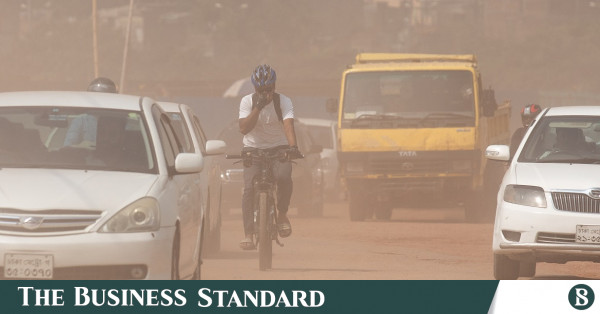Representational image. Photo: TBS
“>

Representational image. Photo: TBS
Dhaka residents have been able to breathe clean air for only 31 days in the last nine years, according to a study by the Center for Atmospheric Pollution Studies (CAPS).
In a report, it says according to the analysis of Air Quality Index data from 2016 to 2024 (3,114 days of data) received from the US Embassy in Dhaka, the capital’s residents have had 624 days of moderate air, 878 days of air unhealthy for sensitive groups, 853 days of unhealthy air, 635 days of very unhealthy air, and 93 days of hazardous air during this period.
Presenting the findings at a press conference titled “World Earth Day 2025: What to do to control air pollution” at the Dhaka Reporters Unity today (22 April), CAPS Chairman Ahmed also spoke about the increasing trend of unhealthy air quality.
“There were 86 very unhealthy days in 2021 and 133 unhealthy days in 2023. But in 2023, out of 365 days, 14 days were very unhealthy or hazardous, which was more than in other years. On the other hand, out of 366 days in 2024, the number of very unhealthy or hazardous days increased to 35 days.”
He said, “Dhaka had the highest number of days with very unhealthy air quality in 2023 and 2021 in the last nine years. During this entire time, the people of Dhaka were able to breathe clean air for only 31 days.”
Speaking at the event, Bangladesh Poribesh Andolon (Bapa) President Nur Mohammad Talukder said, “The levels of air pollution and noise pollution have reached such a high level that Dhaka city has become uninhabitable. The intensity of this pollution is increasing day by day.”
He said if the pollution was not stopped now, then dire consequences would follow, mainly affecting children and the elderly.
Bapa Vice President M Firoz Ahmed said, “If the air is polluted, the human body will suffer serious damage. To control air pollution, the sources of pollution must first be identified.”
He said one of the causes of air pollution is transboundary movement.
An annual 15/20 micrograms of pollution is mainly due to transboundary movement, he added.
“It is important for us to first stop the pollution in our own country, and then we must take necessary steps through Vision 2030 to stop the pollution caused by transboundary movement by discussing with other countries.”
He demanded to reduce pollution by increasing the use of renewable energy and composting solid waste in agriculture.
M Shahidul Islam, chairman of the Department of Geography and Environment, Dhaka University, said, “In the last 15 years, pollution in the country has increased due to the abnormal increase in coal-based power projects. The previous government has destroyed the environment of the entire country, including the Sundarbans, by taking up one environmentally destructive project after another… We want the current interim government to give utmost importance to the environment of the country.”
The press conference was jointly organised by Bangladesh Poribesh Andolon (Bapa) and the Center for Atmospheric Pollution Studies (CAPS) on the occasion of World Earth Day-2025.


